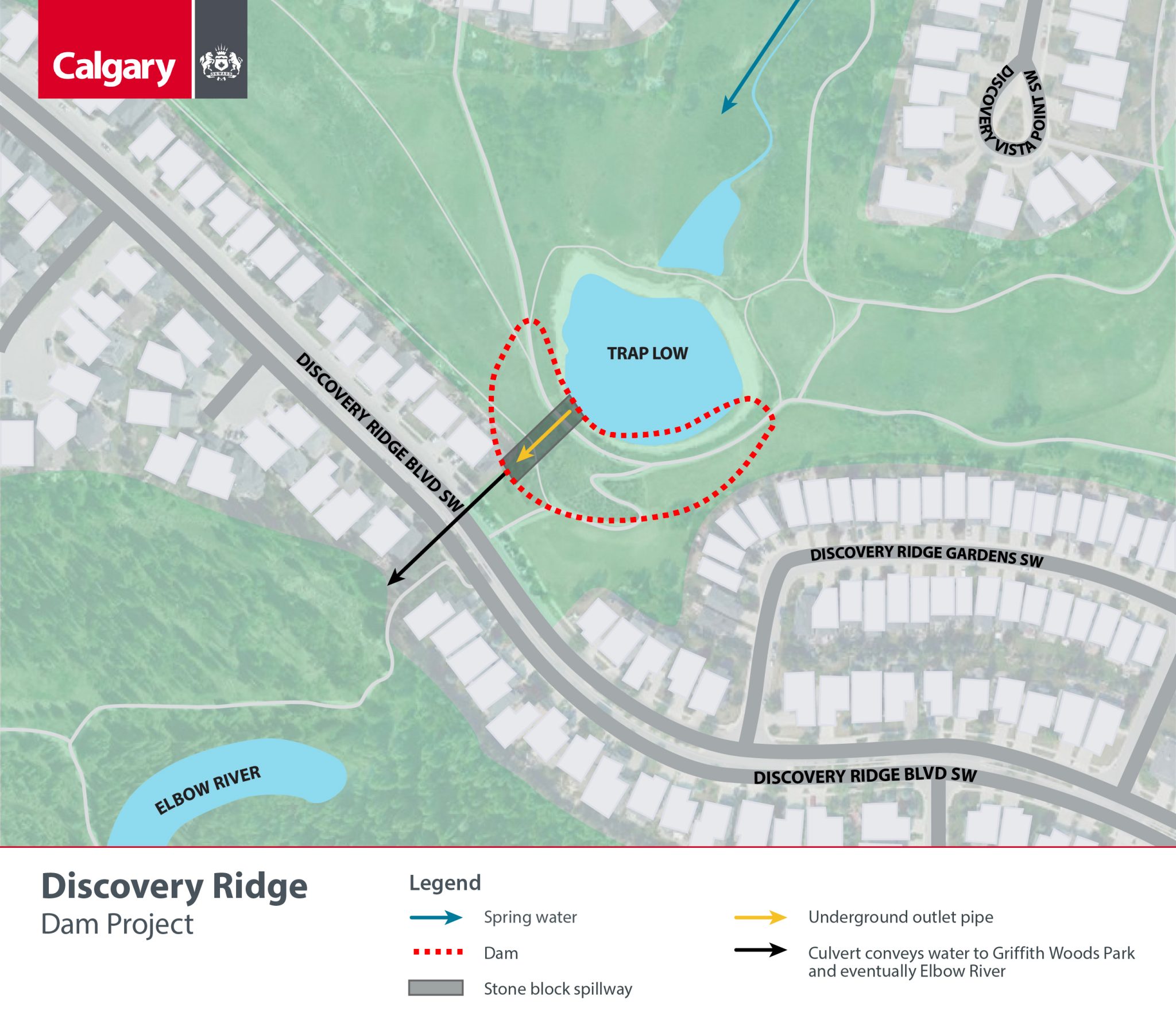Discovery Ridge Dam safety
Project background
As part of The City’s Pond Maintenance and Dam Safety Programs, engineering and condition assessments were completed on the Discovery Ridge Dam. The assessments showed that a portion of the dam’s embankment had potential slope stability risks and a dam safety review outlined several additional deficiencies.
In 2024 we undertook interim actions to address the known risk, while we develop a long-term plan for the dam, including:
- Clearing debris from the outlet of the pond, to reduce the water level.
- Installing real time pond level monitoring equipment.
- Increasing the frequency of groundwater monitoring in addition to ongoing routine engineering inspections.
- Extending the outlet pipe, permanently lowering the water level.
Did you know?
This body of water was originally created as a water source for agricultural uses in the 1950s. It is not considered a stormpond as no storm pipes enter the pond and the water source is a natural groundwater spring with small amounts of local overland drainage.
Nearby projects
Discovery Ridge Pond 39WLA - Storm Pond Sediment Removal

Dam: a barrier constructed for the purpose of storing, diverting, or retaining water. Dams can be created from various materials including concrete, metal, or earth. The dam at Discovery Ridge is created from earth.
Trap Low: a depressed or naturally low area where water pools.
Spillway: a controlled area where excess water can flow out of the trap low when the water level exceeds the safe level.
Project updates
November 20, 2025 - Community Information Session Presentation
Review the November 20, 2025 information session presentation and a summary of community feedback
January 29, 2026 - Technical Information Session Presentation and Q&A
Review the presentation and a summary of questions and feedback. If you would like a copy of the two reports referenced in the presentation, please email DiscoveryRidgeDamSafety1@calgary.ca.
Project status
Over the past year, the City has worked with independent, third-party consultants to complete an analysis of the dam and surrounding area. We are working on designs that will remove the existing dam and replace it with a natural channel or wetland to move spring water through the same area. The surrounding area would be a natural, or wild park area, supporting biodiversity in the community.
We are currently in the early stages of designs and we expect to have these completed in early 2026. When this phase is completed, we will ask the community for input before moving into a more technical design phase and execution. We expect community engagement to occur in early 2026.
Project timeline
- Dam safety review completed
- Interim actions taken to lower trap low water level
Concept design start
Community information session and information sharing
- Concept design complete
- Community engagement begins
Detailed design and regulatory approvals
Construction
Frequently asked questions
Why is The City removing the dam?
We are removing the dam because the 2024 Independent Dam Safety Review reported the dam slope doesn’t meet stability requirements, posing a danger to the community and requiring immediate attention.
Why can’t the existing dam be repaired?
Keeping the dam would require extensive upgrades and construction with no guarantee of preventing dam failure in the future. This is a risk to the community.
To comply with regulatory and industry standards, the water level would need to be lowered substantially, which would negatively impact the surface area and aesthetics. In addition, there is insufficient physical space to install the additional structural support required on the east side of the dam.
What will replace the dam?
We are working on designs that will remove the existing dam and replace it with a natural channel or wetland to move spring water through the same area. The surrounding area would be a natural, or wild park area, supporting biodiversity in the community.
When was the Dam Safety Review completed?
The Dam Safety Review was completed in 2024. This report is what led to the interim actions taken by the City in spring 2024, including lowering the water levels, extending the outlet pipe and clearing debris around the existing outlet.
Since then, we have lowered the dam safety risks to the community by installing real-time pond level monitoring equipment, groundwater monitoring, and completing regular engineering inspections as well as analyzing those results.
Will the community have a chance to provide input?
Yes, the community will have an opportunity to provide input on the proposed designs in early 2026.
What is the timeline for this project?
We are currently in the early stages of designs and we expect to have these completed in early 2026. When this phase is completed, we will ask the community for input before moving into a more technical design phase and execution.
What impacts will this project have on the existing environment and wildlife in the area?
Environmental assessments are being completed to inform the design of the project.
Sign up to receive updates regarding the Discovery Ridge Dam Safety Project
For more information about dams in Alberta visit Alberta.ca - About dams


